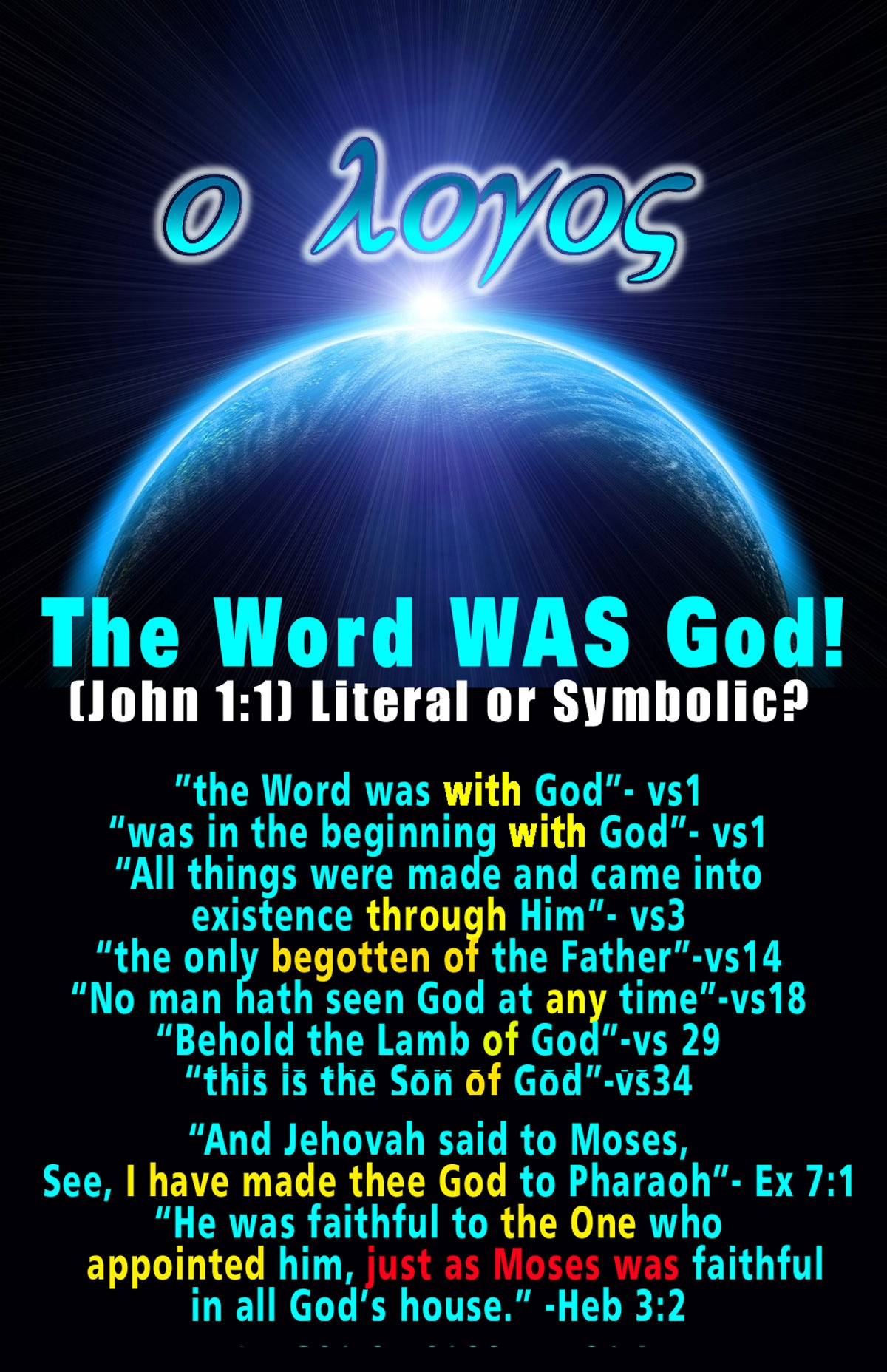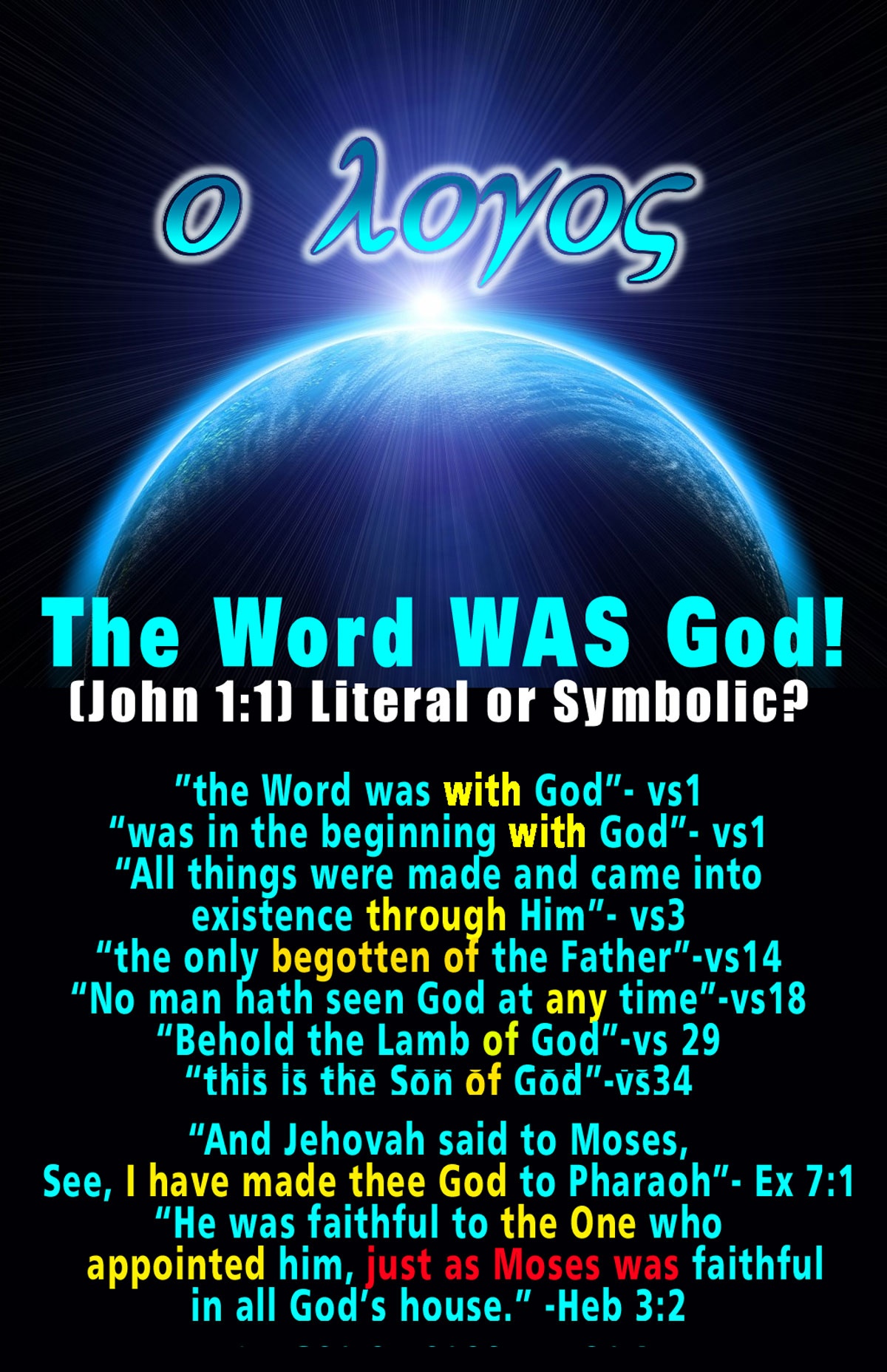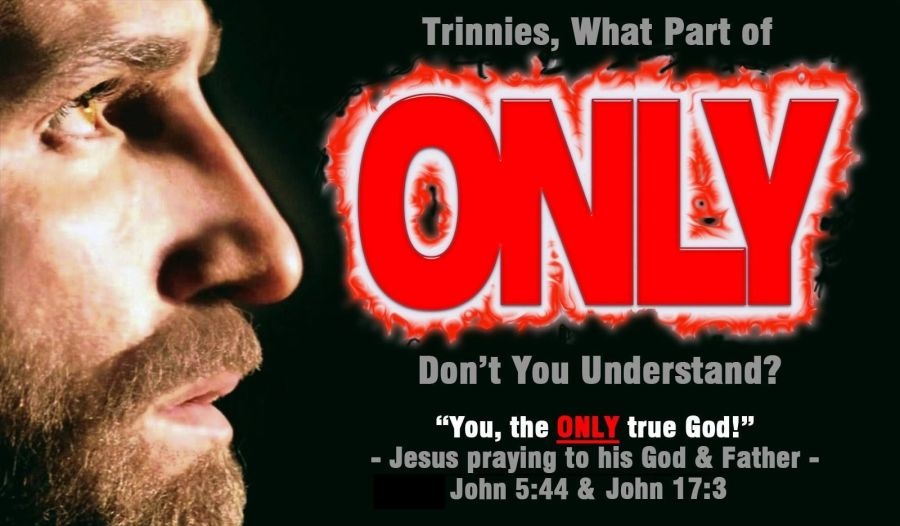John 1:1 and the words of JESUS thruout that book!
Churchianity teaches it to mean that "In the beginning was Jesus, and Jesus was with Jesus, and Jesus WAS Jesus.
And we swallowed that as churchoids (people who believe Church rather than the Bible).
Lets take a MUCH closer look at John 1:1, and what Jesus' words have to say about it IN ORDER from the book of John!
Do you REALLY believe that Jesus taught THAT?
themadjw.weebly.com
253-652-4443
Comments
-
John 3:16- For God so loved the world, that he gave his only begotten Son, that whosoever believeth in him should not perish, but have everlasting life. 17-For God sent not his Son into the world to condemn the world; but that the world through him might be saved. 18- He that believeth on him is not condemned: but he that believeth not is condemned already, because he hath not believed in the name of the only begotten son of God.
Churchianity teaches God (all 3 of them) came Themselves!
Do you REALLY believe that Jesus taught THAT?
themadjw.weebly.com
253-652-4443
-
Koine Greek Biblical text says:
Ἐν ἀρχῇ ἦν ὁ λόγος, καὶ ὁ λόγος ἦν πρὸς τὸν θεόν, καὶ θεὸς ἦν ὁ λόγος. (John 1:1 SBLGNT)
In beginning was being The Word, and The Word was being with The God, and God was being The Word. (my literal translation) Thankful for "aha" moment when pondering past time Greek verb tenses, John 1:1 ἦν spelling of εἰμί (to be) is imperfect tense => continuous action in past time. Koine Greek verbal system has three other tenses that can have secondary past time for action. Kind of action is always primary in Koine Greek, which is different than English verbs primarily expressing time of action: past, present, future.
Phrase "God was being The Word" concisely expresses The Word quality was fully being God, but God entity was being more than The Word (applying Greek grammatical rule, known as Colwell's Construction). Hebrew word e-lo-HEEM אֱלֹהִ֜ים God is plural, which includes The Father, The Word, and Breath The Holy (Hebrew plural is a minimum of three as noun spelling also has dual: eyes, ears, ...).
Greek grammar implication is if John 1:1c phrase had been "The God was being The Word", then the text would say complete interchangeability, that is "The God = The Word", which would have corollary posted by @theMadJW on May 12 "Churchianity teaches it to mean that "In the beginning was Jesus, and Jesus was with Jesus, and Jesus WAS Jesus."
Keep Smiling 😊
-
Lets take a MUCH closer look at John 1:1...
Certainly, and perhaps you will be able to answer the following question specifically regarding the final clause of the verse.
First, the background:
So far I've not come across any statement on the JW website for what John, in the WT opinion, would have written had he wanted to inform readers clearly that "...the Word was God" in verse 1.
I have read the WT arguments given for their translation "...the Word was a god", which is based on the anarthrous θεὸς used in the clause; however, as I just mentioned above, the WT lacks in providing a clear example of how the Greek text ought to appear so as to be read "...the Word was God".
Second, the question:
So, the question I'll then ask of you, is how should the Greek text of the third clause in John 1:1 have been written to express without any doubt, by WT translation standards, "...the Word was God"?
-
Sigh. Polytheists trying to read the Trinity into the Bible.
Do you REALLY believe that Jesus taught THAT?
themadjw.weebly.com
253-652-4443
-
The word was DIVINE, as some translations have it. Remember, the Word was WITH God- mentioned TWICE!
Do you REALLY believe that Jesus taught THAT?
themadjw.weebly.com
253-652-4443
-
The word was DIVINE, as some translations have it. Remember, the Word was WITH God- mentioned TWICE!
Unfortunately, this response does not address the particular question I raised regarding how the Greek syntax in the third clause ought to have appeared to express without any doubt for the WT organization that "...the Word was God".
To your response:
Yes, a couple of translations use the word "divine". And yes, "with God" appears once in the second clause of verse 1 and again in verse 2 – a differentiation is made.
Below, I'll illustrate what I have been searching for from the WT with regard to the third clause in verse 1 utilizing the first statement from your response "The word was DIVINE, as some translations have it."
An if... then... style of argument, only for example, follows:
It has been argued that had John wished to express "divine" he would then have used the available term θεῖος in place of θεὸς; therefore, ....
The question previously raised, and still to be answered:
As stated earlier in my first post and now again, I find, at least to date, no such type of argument put forward by the WT on the JW website regarding the final clause of verse 1 (i.e., had John instead written cba than abc in this last clause we, the WT, would have rendered θεὸς as "God"; however, this is not the case and we, the WT, retain the translation "a god".
Is there something like this available anywhere in the WT teaching?
-
I tire of people finding fault with the WTBS- what we're talking here is the Bible itself.
Jesus said he served God.
THAT is enough for me!
Do you REALLY believe that Jesus taught THAT?
themadjw.weebly.com
253-652-4443
-
I tire of people finding fault with the WTBS- what we're talking here is the Bible itself.
In response, yes we are talking about scripture – more specifically the grammatical syntax of the last clause of Jn. 1:1 which at this time it would seem remains unaddressed.
Further, did not the WT provide the NWT and the teaching guides on the scriptures themselves? And is it not from these mentioned sources that the foundation of theological beliefs are derived and communicated to followers which are then passed on by interaction with the general public and through missionary activity?
Had I discovered the definitive answer to my question on the JW website then I would not be asking it of you on this thread.
So then, would it not be appropriate to seek for the answer to my question from a follower of the WT on a thread started by this same follower having "Lets take a MUCH closer look at John 1:1..." in it?
The question is quite simply one of grammatical construction pertaining to how would the NWT translators express "...the Word was God" from the text in the third clause of verse 1.
If you come across the answer please let me know.
-
Look- the Koine Greek language is far different to our own- so the safe bet is matching John's statement with what Jesus taught.
You agree?
Do you REALLY believe that Jesus taught THAT?
themadjw.weebly.com
253-652-4443
-
Look- the Koine Greek language is far different to our own- so the safe bet is matching John's statement with what Jesus taught.
You agree?
Greek and English are different one to the other; however, it is the Greek text from which our English NT translations are derived.
In this instance, and as has been communicated in your first response, there are some translation differences regarding the last clause of verse 1: as your response pointed out there are a few translations that render the clause "...the word was DIVINE"; then, there are a few others rendering "...the Word was a god" the most well-known being the NWT; and finally, the majority of English NT translations having "...the Word was God".
Below is an interesting example of John 1:1 from Joseph Smith's bible translation project (JST 1830-1844). For anyone interested this is available online at the LDS website. https://www.churchofjesuschrist.org/study/scriptures/jst/jst-john/1?lang=eng
1. "In the beginning was the gospel preached through the Son. And the gospel was the word, and the word was with the Son, and the Son was with God, and the Son was of God"
As can be seen from the above examples there is some difference in rendering the last clause, and in the JST immediately above a trainwreck ensues for the entire verse.
The Greek text of this clause has not changed nor would any of the translators claim it has. What has of course changed is the clausal meaning being conveyed explicitly by each of the individual renderings.
Regarding the words of Jesus: all of scripture is God-breathed (2Tim. 3:16) not only just the words attributed to Jesus.
-
@theMadJW posted:
Look- the Koine Greek language is far different to our own- so the safe bet is matching John's statement with what Jesus taught.
I draw conclusions about Trinitarian theology that are similar to yours in their core assertions, but I don't understand your refusal to-date to address directly the question @Pages has now posed to you on multiple occasions: In my words that question is this: The NWT translates the final clause of John 1.1 in a way that differs substantively from the translation proposed by most other English translations. Clearly NWT translators believed the Greek of that final clause should be translated, "and was a god" rather than "and the Word was God." Fine. Their choice. But what would the Greek at the end of John 1.1 have had to be in order for NWT translators to have translated it, "and the Word was God"? Do you know? Have NWT translators ever offered a response to that question? Surely NWT translators acknowledge that there DOES exist a collection of Greek words that is most accurately translated, "and the Word was God." What is that collection of words?
DISCLAIMER: I have no original language skills, so I can make no contribution to the discussion. But I remain curious about this issue and hope you will engage it directly.
-
Yes or No.
Do you REALLY believe that Jesus taught THAT?
themadjw.weebly.com
253-652-4443
-
You a lawyer?
John 1 says the Word WAS God once, that he was WITH God twice.
Ex 7:1- Has God calling MOSES God.
Seems to me it should be OBVIOUS!
Do you REALLY believe that Jesus taught THAT?
themadjw.weebly.com
253-652-4443
-
Yes or No.
My answer to that is given in my response; however, in short, Yes and No. I believe the affirmative is reflected in my answer regarding Greek to English pertaining to Jn. 1:1; however, the negative is reserved for the proposed "safe bet..." and "...what Jesus taught" line of reasoning which will not bring with it the definitive answer to my one and only question.
-
I prefer to believe what Jesus said, not on some mistaken reading over what John said.
Aren't you following along with the topic what Jesus said about John 1;1- I went very carefully thru John to compare what JESUS said!
Do you REALLY believe that Jesus taught THAT?
themadjw.weebly.com
253-652-4443
-
The fact of the matter is John 1;1 is referring to Two separate beings (not three) and Trinitarians don't want to accept that EITHER- that's why they try to insert the Trinity. What else is there; that there exist 2 Gods?
Do you REALLY believe that Jesus taught THAT?
themadjw.weebly.com
253-652-4443
-
@the_MadJw June 1 What else is there; that there exist 2 Gods?
To me, the New World Translation of John 1:1 shows 2 divine entities. How can a translation of John 1:1 "“In the beginning was the Word, and the Word was with the God, and the Word was a god.” be consistent with God's Word ? ("a god" contradicts Isaiah 44:6-11 there is NO god beside יהוה Yahweh, the king of Israel, and its redeemer, יהוה Yahweh of hosts)
John 6:28-29 LEB So they said to him, “What shall we do that we can accomplish the works of God?” Jesus answered and said to them, “This is the work of God: that you believe in the one whom that one sent.”
John 14:1 LEB => “Do not let your hearts be troubled. You believe in God; believe also in me.
Be Ye Believing in The God, also in Me Be Ye Believing (my literal translation shows continuous believing action command in present time)
If Jesus knew Jesus was NOT God (e.g. archangel Michael), why would Jesus command disciples to be believing in Jesus the same as The God ?
I believe Jesus (יהוה Salvation) and יהוה intimately share the Holy Name יהוה as it is written in Jeremiah 23:5-6 LEB “Look, days are coming,” declares יהוה Yahweh, “when I will raise up for David a righteous branch, and he will reign as king, and he will achieve success, and he will do justice and righteousness in the land. In his days Judah will be saved, and Israel will dwell in safety, and this is his name by which he will be called: ‘יהוה Yahweh is our righteousness.’
Hebrew word for righteousness has pronoun, suffixed, 1st person, plural so could be translated: 'יהוה Yahweh righteousness We'
Grieving Thomas chose to believe Jesus is Lord & God as described in John 20:24-29 LEB Now Thomas, one of the twelve, who was called Didymus, was not with them when Jesus came. So the other disciples said to him, “We have seen the Lord!” But he said to them, “Unless I see in his hands the mark of the nails, and put my finger into the mark of the nails, and put my hand into his side, I will never believe!” And after eight days his disciples were again inside, and Thomas with them. Although the doors had been shut, Jesus came and stood in their midst and said, “Peace to you.” Then he said to Thomas, “Place your finger here and see my hands, and place your hand and put it into my side. And do not be unbelieving, but believing!” Thomas answered and said to him, “My Lord and my God!” Jesus said to him, “Because you have seen me, have you believed? Blessed are those who have not seen and have believed.”
I believe One unique God has three distinct voices (so "polytheist" does not describe me).
Keep Smiling 😊
-
Please. You've blanked out.
Do you REALLY believe that Jesus taught THAT?
themadjw.weebly.com
253-652-4443
-
I prefer to believe what Jesus said, not on some mistaken reading over what John said.
I assume this is your response to me.
Well and fine, but on what grammatical foundation do you rest your claim that there is "...some mistaken reading..." when you yourself have not in any way directly answered my question, nor directed me to a WT source having the answer to my question.
To your statement above I ask what then does your belief preference default to when there occurs some mistaken reading over what Jesus said?
Aren't you following along with the topic what Jesus said about John 1;1- I went very carefully thru John to compare what JESUS said!
Minor quibble, but your post having the graphic display doesn't have any spoken words that are attributed to Jesus. And once again, I will say that all of scripture is God-breathed (2Tim. 3:16) not only just the words attributed to Jesus.
-
@the_MadJw posted:
The fact of the matter is John 1;1 is referring to Two separate beings (not three) and Trinitarians don't want to accept that EITHER- that's why they try to insert the Trinity. What else is there; that there exist 2 Gods?
I didn't ask about the number of beings referenced in John 1.1. I asked what I believed @Pages asked: In the view of NWT translators or those who endorse their translation of John 1.1, what group of Greek words would have to construct the final clause of John 1.1 in order for that clause CORRECTLY to be translated, "and the Word was God"? If you don't want to address that specific question - which is the ONLY question I'm asking - then please say so directly. It's a waste of your and my energies for me to ask, you to evade, and then for us to repeat.
-
John 1:1 has a reference to TWO Gods.
Do ya'll believe in Two Gods?
Do you REALLY believe that Jesus taught THAT?
themadjw.weebly.com
253-652-4443
-
Repeating question for @the_MadJw => In the view of NWT translators or those who endorse their translation of John 1.1, what group of Greek words would have to construct the final clause of John 1.1 in order for that clause CORRECTLY to be translated, "and the Word was God"?
Koine Greek does not have an indefinite article, which is different than English.
Both English and Koine Greek have a numeric one. First use of "one" in John 1 is in verse 3 LEB => All things came into being through him, and apart from him not one thing came into being that has come into being. (italicized words in LEB show English translator addition for smooth English rendering)
John 1:3 Darby => All things received being through him, and without him not one thing received being which has received being.
To me, an implication of John 1:3 is wisdom received being through him, The Word.
@the_MadJw June 2 John 1:1 has a reference to TWO Gods.
Koine Greek grammar rules have helped me appreciate John 1:1 quality of The Word fully being eternal God, but One unique eternal God was/is/will be more than The Word.
Belief "John 1:1 has a reference to TWO Gods." simply contradicts "no God" in Isaiah 44:6 Darby => Thus saith Jehovah, the King of Israel, and his Redeemer, Jehovah of hosts: I am the first, and I am the last, and beside me there is no God.
My belief is Jesus speaking eternal יהוה truth in Revelation 22:13 (Darby) when he said "I am the Alpha and the Omega, the first and the last, the beginning and the end."
@the_MadJw June 2 Do ya'll believe in Two Gods?
NO, I believe One unique God has three distinct voices. Caveat is my answer only expresses my belief so does not answer for all thread posters.
Keep Smiling 😊
-
I, definitely smiling! So you think John 1 was referring to 3 Gods? Or a 3-in-one God?
The same also says (twice) that he was WITH God.
How do you answer this?
Do you REALLY believe that Jesus taught THAT?
themadjw.weebly.com
253-652-4443
-
I don't quote the NWT since none of you trust it. I am asking these questions based on what John 1: 1 says from NON-NWTs. If you can't take that, adios!
Do you REALLY believe that Jesus taught THAT?
themadjw.weebly.com
253-652-4443
-
I didn't ask you to quote from the NWT, or about how non-NWT translations render John 1.1. (FWIW, you and I probably have lots of common theological ground when it comes to the meaning of the Prologue of John's Gospel.) I asked you my version of the question I think @Pages asked you earlier in this thread: What collection of Greek words, were they to comprise the third clause of John 1.1, would ACCURATELY be translated "and the Word was God"?
Again, if you can't or don't want to answer that question directly - and the fact that you've evaded answering it directly on the seven occasions it's been put to you in this thread suggests that you either can't or don't want to answer it directly! - simply say so and this unproductive game of ask and evade will end.
-
The word "Elohim" can mean either God, Gods, or divine.
No upper case in Koine Greek!
Why do you AUSSUME?
This site is near being dead!
Do you REALLY believe that Jesus taught THAT?
themadjw.weebly.com
253-652-4443
-
John 3:13- No one has ascended into heaven but he who descended from heaven, the son of man.
He confirmed that his life originated in Heaven! (And that people haven't gone there at 'death')
Do you REALLY believe that Jesus taught THAT?
themadjw.weebly.com
253-652-4443
-
I don't quote the NWT since none of you trust it. I am asking these questions based on what John 1: 1 says from NON-NWTs.
@Bill_Coley is quite right in his response to this – there has been no request for you to quote from the NWT or any other translation for that matter. That would not itself provide the answer to the actual question at hand. The question revolves solely on what does the WT officially say, if anything, the Greek wording of the third clause needs to be in order to express "...the Word was God".
This question I first asked at the beginning of this thread has now been re-phrased on several occasions by myself, then Bill, and now more recently @KS4J has expressed interest in hearing an answer as well.
No upper case in Koine Greek!
Minor quibbles once again, wouldn't the majuscule, or uncial, style of script used be considered uppercase Greek?
Ⲉⲛⲁⲣⲭⲏⲏⲛⲟⲗⲟⲅⲟⲥⲕⲁⲓⲟⲗⲟⲅⲟⲥⲏ̅
ⲡⲣⲟⲥⲧⲟⲛⲑ̅ⲛ̅·ⲕⲁⲓⲑ̅ⲥ̅ⲏⲛⲟⲗⲟⲅⲟⲥ (John 1:1– Codex Alexandrinus – early 5th century)
As opposed to the minuscule writing style below.
Ἐν ἀρχῇ ἦν ὁ λόγος, καὶ ὁ λόγος ἦν πρὸς τὸν θεόν, καὶ θεὸς ἦν ὁ λόγος. (John 1:1)
"majuscule, in calligraphy, capital, uppercase, or large letter in most alphabets, in contrast to the minuscule, lowercase, or small letter." (majuscule. Encyclopedia Britannica. https://www.britannica.com/topic/majuscule)
The word "Elohim" can mean either God, Gods, or divine.
How exactly does "Elohim..." answer the specific question that has been asked numerous times of you in this thread regarding the last clause of Jn. 1:1?
-
I haven't paid any attention to the WT, since it has begun it's 'Dumb-down' policy.
It boil's down to what Christ had to say about his God- wouldn't you agree- instead of resting faith in a Greek scholar?
Do you REALLY believe that Jesus taught THAT?
themadjw.weebly.com
253-652-4443
-
5:22-For the Father judgeth no man, but hath committed all judgment unto the Son:
23-That all men should honour the Son, even as they honour the Father. He that honoureth not the Son honoureth not the Father
which hath sent him.
24-Verily, verily, I say unto you, He that heareth my word, and believeth on him that sent me, hath everlasting life, and shall not come into
condemnation; but is passed from death unto life.
(Notice that Christ HIMSELF says believing in His Father, as well, means life!) Who do YOU think his Father is???
Do you REALLY believe that Jesus taught THAT?
themadjw.weebly.com
253-652-4443






